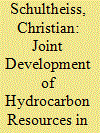| Srl | Item |
| 1 |
ID:
173426


|
|
|
|
|
| Summary/Abstract |
After the tribunal in the South China Sea arbitration found that China is not entitled to claim maritime zones beyond the entitlements that the Law of the Sea provides for, the Philippines and China reentered into negotiations about the joint development of hydrocarbon resources and have come to an understanding on fisheries. Philippine lawyers have criticized these attempts as “waiving” or “compromising” the arbitral tribunal’s award and the Philippines’ claim. This article analyzes the consequences of the award for state obligations under Articles 74(3) and 83(3) of the United Nations Convention on the Law of the Sea. The article discusses whether and in what way joint development arrangements adopted despite the absence of China’s entitlement to the maritime area in question could prejudice or be factually detrimental to the Philippines’ claim.
|
|
|
|
|
|
|
|
|
|
|
|
|
|
|
|
| 2 |
ID:
173425


|
|
|
|
|
| Summary/Abstract |
State practice reveals that the main reason states conclude maritime delimitation agreements is their desire to reap the benefits accruing from offshore natural resources, especially hydrocarbons. However, international jurisprudence has not expressly taken nongeographical factors into consideration in delimitation cases, even though it has also not totally disregarded them. Since such factors individually have been in the judges’ minds, it is suggested that if a state is capable of proving that these factors indicate the existence of fundamental interests in an undelimited area, all of those should be contemplated in accumulation and form a distinct concept, namely, the “predominant interest.” In a nutshell, the concept analyzed in this article refers to the aggregation of a gamut of nongeographical factors that, although they have not been taken into consideration separately in delimitation cases, tend to evince the existence of fundamental interests, which form a broader one, namely, the “predominant interest.” This article proposes that the “predominant interest” concept could be utilized by international courts and tribunals in order to check the equitableness of a maritime boundary at the second stage of the delimitation process concerning the continental shelf/exclusive economic zone (EEZ), after relevant circumstances predicated on geographical factors have been examined. In any case, though, it is asserted that this concept should not be invoked so as to justify excessive claims. To the contrary, it should be applied in support of contentions made in good faith with a view to safeguarding the essential interests of a state.
|
|
|
|
|
|
|
|
|
|
|
|
|
|
|
|
| 3 |
ID:
173427


|
|
|
|
|
| Summary/Abstract |
It is clear from the plain words of the Article 76, paragraph 10, of the UN Convention on the Law of the Sea that the questions involving the outer limits of the continental shelf beyond 200 nautical miles are without prejudice to the question of delimitation of the continental shelf between states with opposite or adjacent coasts. However, the two processes impact each other, which gives rise to more complex dynamics than may be perceived from a cursory reading of Article 76. This article explores the relationship between the two separate but inherently related processes in light of the relevant jurisprudence and doctrinal commentaries thereto.
|
|
|
|
|
|
|
|
|
|
|
|
|
|
|
|
| 4 |
ID:
173424


|
|
|
|
|
| Summary/Abstract |
This article revisits marine bioprospecting in the Southern Ocean in the context of the efforts to develop an international legally binding instrument (ILBI) under the United Nations Convention on the Law of the Sea on the conservation and sustainable use of marine biological diversity in areas beyond national jurisdiction. After briefly introducing the Antarctic Treaty System (ATS), this article examines the extent to which the ILBI will likely spatially overlap with the ATS. As the next step, it is highlighted that future provisions on marine genetic resources (MGRs) in the ILBI might substantively differ from the way the ATS currently regulates bioprospecting. Based on that, the final section reflects on how the ILBI will normatively and institutionally relate to the ATS.
|
|
|
|
|
|
|
|
|
|
|
|
|
|
|
|